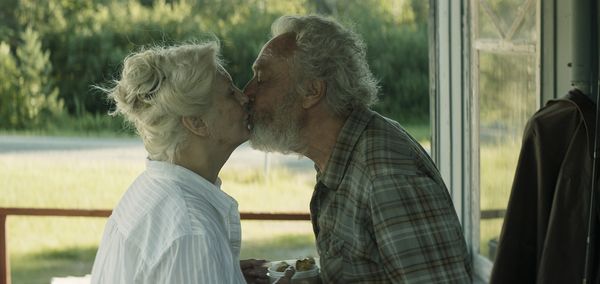Eye For Film >> Movies >> And The Birds Rained Down (2019) Film Review
And The Birds Rained Down
Reviewed by: Amber Wilkinson

Louise Archambault has a strong back catalogue of television work and it shows in her third film, an adaptation of Jocelyne Saucier's And The Birds Rained Down - as she takes on enough different plot strands to fill a six-episode series in her sprawling tale of old friendship and new love set against the backdrop of a remote area of woodland threatened by forest fires. While the film features plenty of poignant moments – not least concerning the idea that it's never too late to start afresh – the writer/director struggles to juggle the multiple stories, giving an uneven result.
The framework is provided by the tale of three elderly men who have turned their backs on society and retreated to the backwoods with their dogs, where they (mostly) enjoy one another's company. The seclusion of the curmudgeonly Charlie (Gilbert Sicotte), quiet Ted (Kenneth Welsh) and not-so-recovering alcoholic singer Tom (Rémy Girard) is largely unbroken except for the occasional visit from Steve (Éric Robidoux), the manager of a nearby virtually empty hotel, who swaps provisions for weed.
It is Steve who pierces their bubble, when he brings not one, but two, women into the old men's sphere. One is go-getting photographer Raf (Ève Landry), who is hunting Ted as part of a project to track down survivors of a wildfire that ripped through the area decades before and caused those birds of the title to suffocate and rain down. The other interloper is Gertrude (Andrée Lachapelle), a newly discovered aunt of Steve's who has spent her life unfairly institutionalised at a psychiatric hospital and, after a taste of freedom for his father's funeral, is desperate not to go back.
The men, with varying degrees of reluctance, accommodate both women and a tentative relationship develops between Charlie and Gertrude - who has taken on the fresh name of Marie-Desniege. This provides many of the film's best moments, with Sicotte and Lachapelle offering gentle chemistry as their romance blossoms into something with real heat, captured warmly by cinematographer Mathieu Laverdière who, while putting the beauty of the area to good use as a backdrop, never loses focus on the people at the heart of story as Marie offers a flipside view of what freedom means. Here the film is at its most interesting, offering up different perspectives on sequestration and the right to choose your own path (dogs, it seems, don't get a say).
Less successful is the burgeoning romance between Raf and Steve. Every time we are away from the older generation, they're sorely missed and the action drags without their presence. There's also an emphasis on darker themes in the final act that feels metaphorically laboured compared to what has gone before. Ultimately, it's the romance between Charlie and Marie that lingers, not the ruminations.
Reviewed on: 11 Nov 2019














